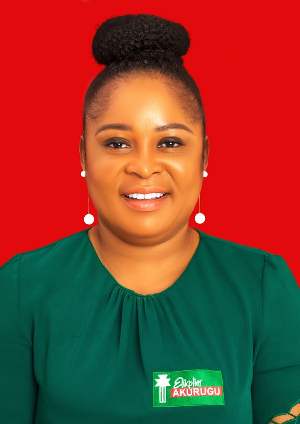The Member of Parliament for Dome Kwabenya in the Greater Accra region,Faustina Elikplim Akurugu has underscored the significant contribution of Unit Committee members towards deepeninig Ghana’s local governance system.
According to her, Unit Committees have played tremendous roles in “engaging communities, mobilizing citizens for development, and implementing policies at the grassroot level” for the development of the country.
She noted, despite the crucial roles played by the over 43,500 unit committee members across the country over the years, their efforts are not appreciated. They are confronted with major challenges that needs urgent attention to safeguard the development of the country.
The MP disclosed these on the floor of Parliament on Wednesday 19 February 2025 in a statement concerning the challenges faced by the Unit Committee members in the performance of their duties at the local levels.
Mrs Faustina Elikplim Akurugu said the difficulties facing the Unit Committee members include; lack of empowerment, low recognition and renumeration, neglect by central government, misunderstanding with Zonal Council among others.
Read the full statement below:
Statement by Hon Faustina Elikplim Akurugu on Deepening Local Governance in Ghana: Addressing the Challenges of Unit Committee Members
Mr. Speaker, I thank you for the opportunity to address this august house on the critical role of local governance in Ghana’s democratic development, particularly addressing the challenges faced by Unit Committee members in our various local government units.
Mr. speaker, local governance continues to form the bedrock of Ghana’s participatory democracy, ensuring that governance is brought closer to the people. Ghana’s decentralization system, established under chapter twenty of the 1992 Constitution and the Local Governance Act, 2016 (Act 936), provides the framework for grassroot governance with district assemblies as the highest political and administrative authorities at the local level. The Unit Committee, as the lowest structure of the local government, is essential in engaging communities, mobilizing citizens for development, and implementing policies at the grassroot level.
However, Rt. Honourable Speaker, despite the importance placed on the Unit Committee, it continues to face challenges that hinder its work. A couple of days ago, I met with representatives of Unit Committee Members Association of Ghana; the membership, according to them, is 43,500. They asked me to present their challenges on the floor of this august house. In a petition presented to me, they requested an urgent intervention in addressing the following issues:
- Lack of empowerment
Mr Speaker, the Unit Committee Members feel disempowered due to insufficient authority and participation in the decision-making process. They therefore, want to urge the Ministry for Local Government, Chieftaincy and Religious Affairs to provide clear guidelines that enhance their role in the decision-making process.
- Low Recognition and Remuneration
Again Mr. Speaker, the Unit Committee members state that there is a noticeable low, if not absent recognition and financial remuneration for them. According to them this lack of acknowledgement demotivates them and undermines their commitment. They propose that a structured remuneration framework be put in place to reward and motivate them for their time and efforts.
- Neglect by Central Government
Mr. Speaker, there is a growing concern among Unit committee members for neglect by the Central Government. According to them, this neglect is made manifest in limited communication, inadequate funding and a lack of involvement in policy formulation that affects local governance. As a result, Mr. Speaker, they seek amendment in the Act to promote inclusiveness and participation in decision making process and more engagements with the Central Government regarding local issues.
- Capacity Building and Training Needs.
Mr. Speaker, the unit committee members reckon that there is an urgent need for capacity building through training programs tailored specifically for committee members. Such training should be tailored to enhance their skills in governance, project management, conflict resolution, and community mobilization.
- Misunderstanding with Zonal Councils.
Finally, Mr Speaker, the Unit Committee members complained of rising misunderstanding with Zonal Councils which disrupts collaboration and effective planning for community development. They recommend the establishment of regular dialogue sessions to foster understanding and cooperation.
In conclusion, Mr Speaker, addressing these challenges will go a long way to strengthening the effectiveness of the Unit Committee in the local government and ultimately lead to improving the local governance system and community development.
I thank you Rt. Honourable Speaker for the opportunity.



